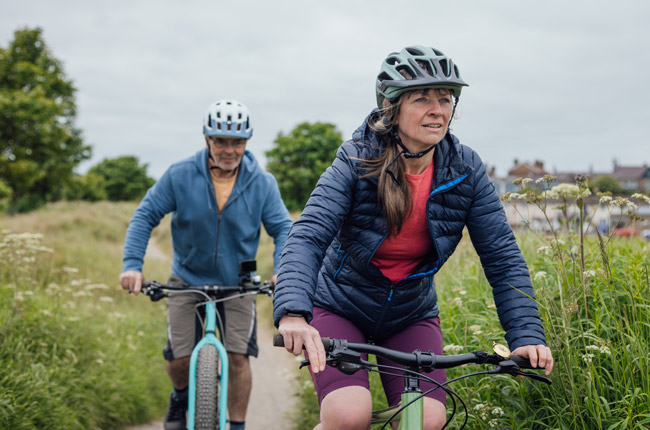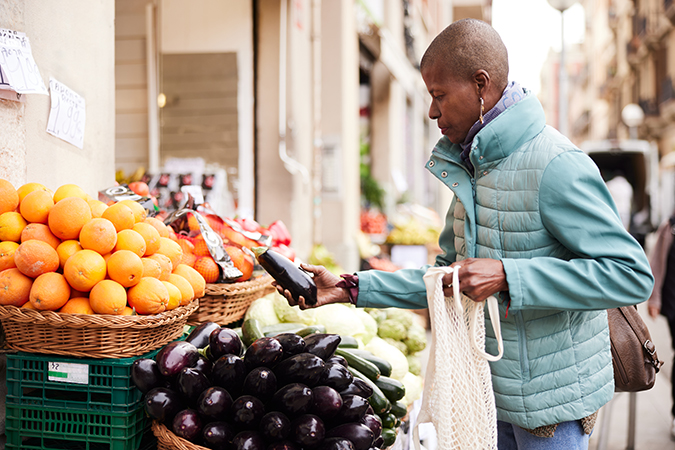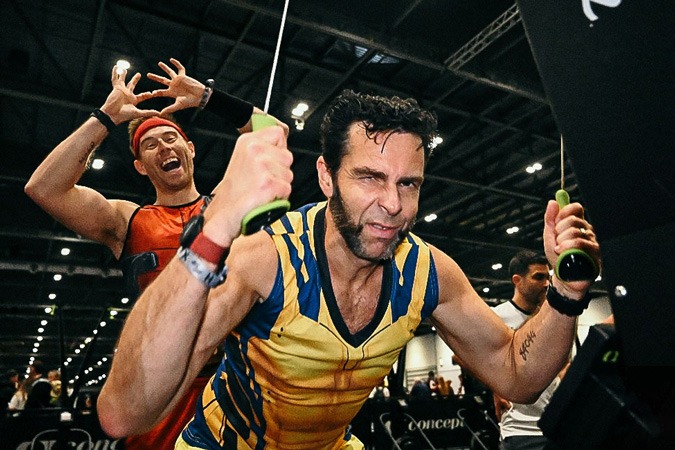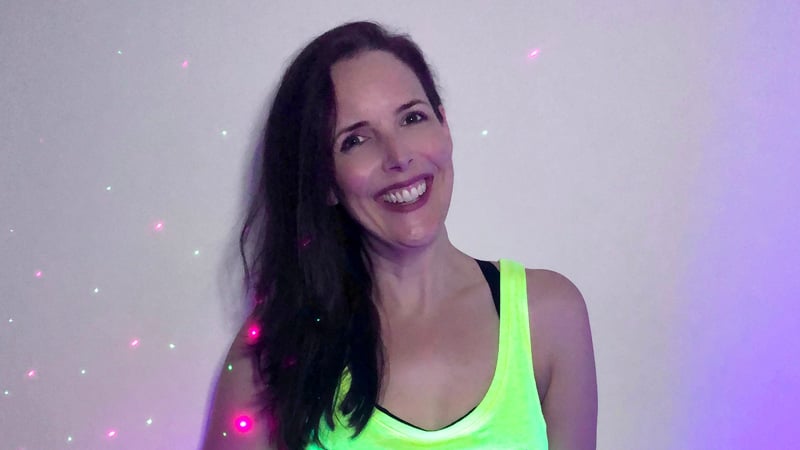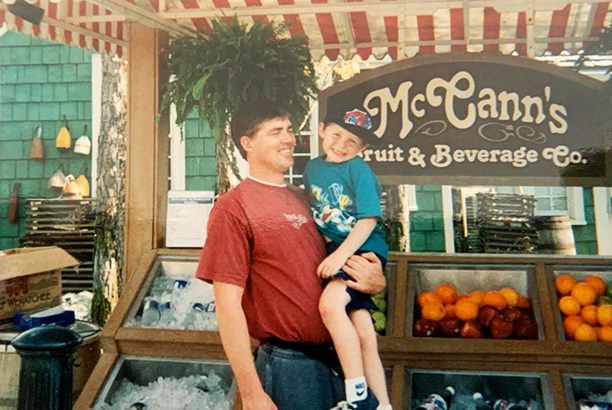Key takeaways:
- The CO21 CHALLENGE Trial found that a structured exercise programme after chemotherapy led to a 28% lower risk of cancer recurrence in colon cancer survivors compared with usual care.
- This is the first randomised controlled trial (RCT) to show that exercise directly improves survival in colon cancer patients. It confirms what observational studies have long suggested.
- The results were presented at a recent conference and made headline news. Experts say the CHALLENGE Trial marks a shift from viewing exercise as a “nice to have” to a “need to have” in cancer care.
Colon (part of the large bowel) cancer survivors who took part in a 3-year structured exercise programme had a 28% lower risk of cancer recurrence or a 2nd cancer. They also had a 37% lower risk of death compared with usual care.
These findings were shared at the 2025 Association of Clinical Oncology (ASCO) Annual Meeting. They were also published in the New England Journal of Medicine.
The ASCO Annual Meeting is the world’s largest oncology conference. It attracts more than 40,000 attendees from around the world. Every year, ASCO highlights the latest advancement in treatments. It also shares the directions that have the greatest potential for progress and patient impact.
Spotlight on exercise
The CO21 CHALLENGE Trial pulled back the curtain on a weapon that has been hiding in plain sight: physical activity. The results of the trial showed improvement in disease-free survival and overall survival in colon cancer survivors in the aerobic exercise intervention group. This trial is the first gold standard RCT to show what has long been indicated from observational studies. This is a big deal!
The impact of exercise on cancer outcomes has been a topic of great debate. Observational research has shown improvements in survival and quality of life linked to higher levels of physical activity. However, observational study designs are limited. They do not show cause and effect.
Plus, they are hard to implement in clinical settings due to concerns that the reported effects may not truly reflect the impact of exercise (and may be due to something else).
Our research
Over the past few years, World Cancer Research Fund International has done extensive reviews through its flagship Global Cancer Update Programme (CUP Global).
CUP Global includes partnerships with American Institute for Cancer Research, World Cancer Research Fund in the UK and Wereld Kanker Onderzoek Fonds in the Netherlands.
Our CUP Global reviews look at the extent to which diet, nutrition and physical activity impact people after a diagnosis of breast and colorectal cancers with regard to:
- cancer-specific mortality
- all-cause mortality
- risk of cancer recurrence
- health-related quality of life
An expert panel judged the strength of this CUP Global evidence. There were some limitations. Still, detailed recommendations were made to strengthen future research. One of the key recommendations was for well-conducted trials to look at the impact of nutrition or physical activity. The CHALLENGE trial is therefore very timely.
The CUP Global analysis was published in the International Journal of Cancer. It was cited several times in the CHALLENGE trial manuscript.
The CUP Global analysis compared highest with lowest levels of activity. We found that all-cause mortality was reduced by 23–40% depending on physical activity exposure.
Prof Anne May, University Medical Centre, Utrecht
During our review of the literature concerning the impact of post-diagnosis physical activity on colorectal cancer prognosis for the Global Cancer Update Programme (CUP Global), we were unable to draw strong conclusions due to lacking evidence from randomized controlled trials. The Challenge trial provides exactly the evidence we were waiting for.
The summary estimate for studies that assessed activity dose was measured in MET hours per week.
- A 10 MET hour per week increase in activity was linked to a 24% reduction in all-cause mortality.
- A change of 10 MET hours per week was also the intervention goal in the CHALLENGE trial.
The effect sizes in this first, gold-standard RCT are remarkably well-aligned with the CUP Global analyses of observational studies.
During the presentation of the trial results at ASCO, the authors shared this chart. It includes the treatment benefits from approved therapies for colon, lung and breast cancer.

With 7–8% gains, you can see that exercise compares very favourably with other approved therapies in terms of absolute overall survival gain.
Collecting clinical trial evidence
The CHALLENGE trial confirms the clinical benefits that had been reported from observational studies. However, previous RCTs have also hinted at the accuracy of the results from observational studies. For example:
- The LEANer trial was published in 2023. It showed that triple negative breast cancer patients randomised to a diet and physical activity intervention before chemotherapy had a 53% higher rate of treatment success (eliminated cancer cells).
- A trial published in June 2025 showed that an exercise programme during and after chemotherapy increased the immune system responses in oesophageal cancer patients.
World Cancer Research Fund will fund the Optimus trial in the UK. Dr David Bartlett and Prof Adam Frampton at the University of Surrey will lead this study. It was proposed due to these findings.
Next steps
Dr Kerry Courneya co-led the CHALLENGE trial. At ASCO, he said these results could change practice for high-risk stage 2 and stage 3 colon cancer.
He expressed reservation that these results could be generalised to other sites and cancer stages. But he was optimistic that similar trials could be done more quickly than the CHALLENGE trial by taking advantage of newer methods. This could include using remote exercise assessments or activity trackers.
Dr Courneya noted that “support from funding agencies like WCRF/AICR is critical to moving this field forward because of limited access to funding for lifestyle research”.
AICR recently funded a project linked to the CHALLENGE Trial. It is led by Dr Kristin Campbell at the University of British Columbia in Canada. It will look at how muscle and fat tissue respond to exercise and how that may contribute to the observed survival benefits.
The response to the CHALLENGE Trial has made media headlines. Cancer researchers, doctors and patients are also excited by the news. This suggests that adding exercise as an additional part of treatment will gain further momentum.
While more trial data will be needed to support broader implementation, we are likely leaving the “nice to have” approach to exercise oncology and entering the “need to have” phase!
Research grants on physical activity
A selection of some of the grants we have funded that focus on the impact of physical activity on people living with and beyond a cancer diagnosis.
Research funded by World Cancer Research Fund has shown that people living with cancer who closely follow a sustainable and nutritious diet – the EAT-Lancet reference diet – have a lower risk of dying from cancer and from all causes.
This is the first study to look at the impact of the EAT-Lancet diet on people living with or beyond cancer – as opposed to the general population. Prof Sabine Rohrmann and her team at the University of Zurich, in collaboration with colleagues from another Swiss university, the UK and Austria, used UK Biobank data to see if closely following this diet – with its emphasis on eating a rich variety of plant foods – affected the risk of death for people with a cancer diagnosis at the time they were recruited for the study.
Studying more than 25,000 people with an average age of 60 years at recruitment, the researchers used dietary information collected in the UK Biobank to develop a score that reflected how closely participants followed the EAT-Lancet diet.
More support needed for people facing cancer
Of the 25,348 cancer survivors in the group studied, 4,781 people died during the study follow-up. Prof Rohrmann’s results showed modest links between closely following the diet and a lower risk of dying from cancer, and of dying from all causes. The researchers didn’t observe a link between the diet and dying from heart disease.
Almost 64% of the participants were female, and participants who followed the EAT-Lancet diet more closely were more likely to be female. However, this study confirmed previous evidence showing that people living with and beyond cancer do not tend to follow healthy diets after their diagnosis. This emphasises the need to help people form healthier habits and overcome the barriers to eating well, such as treatment side-effects affecting appetite and taste.
These findings highlight the importance of greater nutrition support and guidance for people facing cancer. Guidelines aimed at the general population are unlikely to consider the needs of people living with and beyond cancer. With a lack of evidence-based recommendations for this population, the gap can sometimes be filled by practices not supported by the science – such as excessive use of dietary supplements.
This evidence showing the benefits of the EAT-Lancet diet follows recent research by our Global Cancer Update Programme, which provided guidance for people with a breast or a bowel cancer diagnosis.
Prof Sabine Rohrmann
We specifically put the focus of our study on cancer survivors because we believe that it is important to encourage them to follow a healthy lifestyle. For this, we need more evidence and so far, research on lifestyle changes in cancer survivors is still scarce.
Dr Julia Panina, Head of Research Funding
This study provides important new evidence that following the EAT-Lancet reference diet may reduce the risk of mortality in people living with and beyond cancer. The focus on the consumption of plant-based foods reflects our Cancer Prevention Recommendations to eat more wholegrains, vegetables, fruit and beans, and to limit red and processed meat. Importantly, these findings also show that diets supporting cancer survivorship can promote more sustainable eating and help protect the environment.
The EAT-Lancet reference diet was created by a team of scientists (The EAT-Lancet Commission on Food, Planet, Health) in 2019. It is a mainly plant-based diet that, according to the Commission, addresses the environmental impact of food production and consumption better than most national dietary guidelines.
> Read the paper: Higher adherence to the EAT-Lancet reference diet is inversely associated with mortality in a UK population of cancer survivors
> On the blog: Plant-based diets: eating for our health and the planet
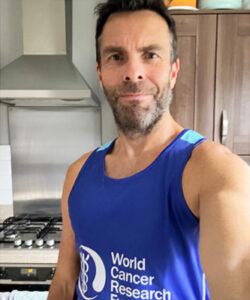 John Steventon is our very own supporter superhero. He completed a HYROX in December dressed as comic book character Wolverine, alongside a friend who dressed as Deadpool – and he isn’t stopping there.
John Steventon is our very own supporter superhero. He completed a HYROX in December dressed as comic book character Wolverine, alongside a friend who dressed as Deadpool – and he isn’t stopping there.
HYROX is an indoor fitness race enhanced by workout stations along the route, so competitors run 1km, then do a workout – 8 times! The workouts include rowing, pulling and pushing a sled, and lunges while carrying a sandbag, making it an exhausting but fun challenge.
John said: “Everything I’ve done in life, I’ve wanted to share with others. As a DJ, I taught aspiring musicians and even wrote DJing for Dummies. In my TV career, I mentor new editors. When I was racing in indoor rowing, I launched the RowAlong YouTube channel to help home rowers stay motivated. So, when I started competing in HYROX, I wondered how I could use this platform to make a difference. “
“I knew I’d never be a podium finisher, but after my skin cancer diagnosis, I found a purpose: racing as Wolverine to raise money for World Cancer Research Fund. The response from the HYROX community has been incredible – not just in donations, but in the conversations I’ve had. Nearly everyone I meet has been touched by cancer in some way, whether personally or through friends and family.”
‘I thought I was invincible’
“Even though the doctor said, “Don’t worry”, when I heard the words “That’s skin cancer” the last hope that I was indestructible fizzled away. I’d always thought I was invincible – after all, I like to dress up as Wolverine – but skin cancer reminded me that none of us are.”
John’s diagnosis helped him become more aware of the importance of cancer prevention. “I remember being 7 years old, resisting my Mum’s attempts to put sun cream on me. I often opted for the lowest SPF possible, thinking sunburn was just a fast track to a tan. Coming from Scotland, where sunshine is a rarity, I’ve always craved the sun’s warmth. But now, I never go without factor 30 or 50. If only I had learned that lesson earlier.
“The guidance from the World Cancer Research Fund has been invaluable in helping me understand the importance of proper nutrition and lifestyle choices in cancer prevention and overall health. Exercise alone isn’t enough – we need to fuel ourselves properly and protect ourselves from preventable risks like excessive sun exposure.”
John continues to take on HYROX challenges to raise money for us. He’s completed 3, including one in Frankfurt, and is running The Grid competition again in September, as well as more HYROX events this year. So far, he’s raised nearly £2,000 towards cancer prevention – thank you, John!
Science and football – while they may not seem like they have much in common, the disciplines meet in the person of Dr Frankie Brown. Frankie is an immunologist and former member of Scotland’s women’s team who has represented her country 96 times on the international stage.
Our funding helped Frankie realise her other dream of researching ways exercise can benefit those living with and beyond cancer.
Helping people with blood cancer
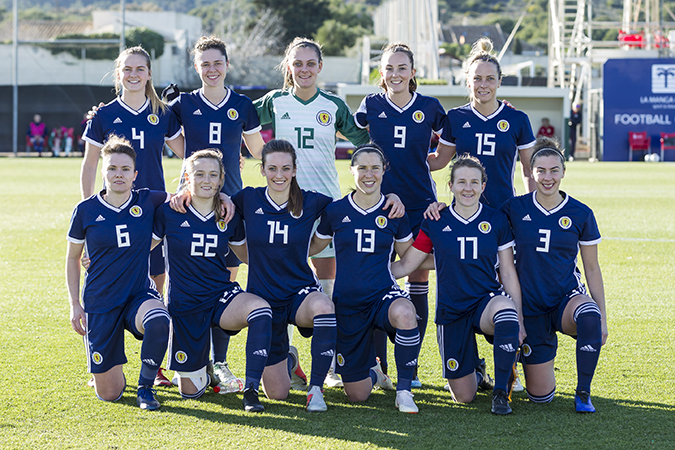
Frankie Brown with her Scotland team-mates
Under Dr Campbell from the University of Bath, Frankie worked in a team on a project funded by us investigating the effects of exercise on the health of patients with chronic lymphocytic leukaemia, a form of blood cancer that affects around 4,000 new people every year in the UK.
The team evaluated the safety and feasibility of a progressive exercise programme for these patients – many who were over 60. Essentially, they tested a “recipe for how to run a big study” more effectively, and even adapted it to continue successfully during the COVID pandemic.
She was inspired by her own background as a professional footballer, as well as her personal experience with cancer:
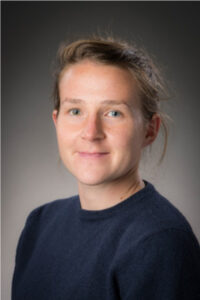 “When I was finishing up my PhD, my mum died of breast cancer. That was a real trigger moment for me to look more into oncology. I just couldn’t get my head around it – she had been so healthy. I would wonder, what’s going on here?
“When I was finishing up my PhD, my mum died of breast cancer. That was a real trigger moment for me to look more into oncology. I just couldn’t get my head around it – she had been so healthy. I would wonder, what’s going on here?
“I already knew a lot about health and monitoring my body for football. I started playing football very young, playing with my little brother, and I haven’t stopped since. I was in the Scotland under 17s, then the under 19s, and got into the full squad when I was 21 and was there for 10 years.
“Having spent my whole life in a high-performance environment, with everything being tested and monitored, I became more aware of how my body reacts to even very small shifts in circumstances and situations. It wasn’t hard for me to see how those tiny changes that are so important to athletes can be important for everybody.”
This inspired Frankie to become a researcher, where she found herself on the team led by Dr Campbell and funded by us. There were, however, some setbacks along the way – the biggest being the COVID-19 pandemic. Thanks to the flexibility of our funding programme, Frankie says she and the rest of the team were able to pivot from designing the programme to be in-person, to buying the participants exercise bikes and running a group session over Zoom.
“We had to shift the whole design of the exercise sessions to be home-based and World Cancer Research Fund allowed us to deliver exercise bikes to the participants’ homes. Without that, the trial would have fallen apart.“
‘The more muscle mass you have as you get older, the more independent you will be’
The data showed a 2% increase in lean mass in the exercise group compared with a 0.4% decrease in the control group. This is a significant benefit, as Frankie explains: “The data we have now and the study we’ve done shows that any gain a patient can make with their performance can make a huge difference to their own wellbeing.
“An increase in lean mass – in other words, in muscle mass – in these patients is a huge thing, especially in people over 60. The more muscle mass you have as you get older the more independent you will be. One of our participants lived up some stairs, and whenever I think about the study, I think about them and hope that my work has made it easier for them to get the shopping up and down to their home.”
These results have informed the design of a larger study where Frankie and her team will assess the tumour-suppressing effects and mechanisms of exercise in humans.
Frankie is very vocal about the impact of our support on her work: “In my experience, World Cancer Research Fund has been incredibly supportive of me as a young academic. They’ve provided amazing flexibility at a very uncertain time. I wouldn’t have been able to achieve any of this without you.”
What do people who took part in the study say?
I was really unfit when I started the trial and in the battle with the bike I came near to collapse! But the research team were watching and got me sorted me out. So I didn't collapse and in fact went on to add 2kg to my muscle mass.
What do people who took part in the study say?
I’m pleased that I took part in the study as although I already did some exercise it pushed me out of my comfort zone and has left me feeling more positive about the future giving me a way to ‘fight back’.

Living with cancer
If you, or someone you love, is going through cancer, we’re here to support you. From answers to common questions, to advice on side-effects and free recipes tailored for people living with cancer, browse all our resources.

